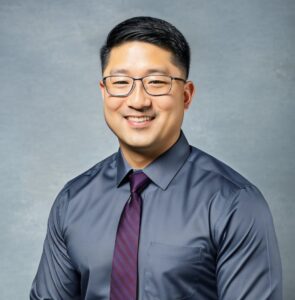For Andrew Min, an alumnus of the UW-Milwaukee Bachelor of Science in Biomedical Sciences: Health Sciences program offered through the UW Flexible Option, being a student helped him realize that teaching is his true calling.
Andrew, who graduated in September 2022 from UW-Milwaukee, is currently teaching in-person associate degree-level occupational therapy courses at Bates Technical College in Tacoma, Wash.
“I attended the program (OTA) that I’m teaching right now. I practiced occupational therapy for about the first five years, and then I got into teaching. For accreditation purposes, they need practitioners to have at least a bachelor’s degree, and I had one out of the country. But because I wanted to continue my education at the graduate level, I had to pursue a degree in the US.”
 Andrew wanted to leverage the experience he already had in the field and knew Health Sciences would be the best option for him. With Health Sciences, professionals who already have a license or an associate degree are awarded 60 credits toward a bachelor’s degree. Andrew also wanted an online competency-based education because he was a working adult with responsibilities at home.
Andrew wanted to leverage the experience he already had in the field and knew Health Sciences would be the best option for him. With Health Sciences, professionals who already have a license or an associate degree are awarded 60 credits toward a bachelor’s degree. Andrew also wanted an online competency-based education because he was a working adult with responsibilities at home.
“I was happy to find out about University of Wisconsin Flex, and I thought, you know what? This sounds like the perfect program for me. I did look at a few other competency-based schools out there, but it looked financially and timewise that this was going to be the best option for me.”
His experience in Health Sciences gave him valuable time management skills and the ability to learn independently. The program he’s currently teaching in at Bates recently evolved to a hybrid flip style (which combines digital and in-person delivery and flips the focus from instruction to interaction among students) and he was able to apply what he learned in his bachelor’s degree to his current teaching role.
“Being able to take what I learned just from my own experience in your program helped me provide some more practical suggestions to students just in the overall flow of how to schedule your time and your study habits. But I think, too, a few of the classes specifically related to what I’m teaching now helped to give me more in-depth knowledge in certain areas. For instance, I did an assignment on the Americans with Disabilities Act, and it was kind of like one that we’ve done here in the program. I didn’t teach that course myself, but just being able to delve a little bit more in-depth into ADA and do a little bit more work on accessibility standards was helpful in helping to guide some of the students on a similar project we were doing and helped to maybe tweak a few of our assignments based on my own experience with that one.”
Andrew also wanted to get his Health Sciences degree relatively quickly so he could move onto graduate school. “I felt like I was on a strict time and financial schedule to a degree. I basically carved out four to five days a week just in the evenings. I always had a set schedule.”
He completed 16 classes within one year, though it took a lot of dedication. “I always set aside a portion of my day or my week to make sure I would never fall behind, and that I would stay motivated, too. Because when things come up and you don’t do your schoolwork for a few days, or even a week, then you just lose that motivation. I feel like always chipping off a little piece at a time just kept me motivated.”
Andrew, who recently began working as a program director for Bates’ OTA program, took some cues on instructional design from his experience in Health Sciences. “That was one of the things I really wanted to do from my UW Flex experience was to make all the courses across my program more uniform,” he says.
He also appreciated the rubrics of competency-based education. “Having the experience of these robust rubrics was helpful for me to help model my rubrics. To introduce more of those partial, adult learning theory strategies, as well as some instructional design pieces, and further enhance my own program so that students feel a little more confident with the assignments and projects that they’re submitting.”
Now that Andrew has had experience practicing and teaching for OTA, he knows that education is where he belongs.
“I’ve realized that this is where I want to stay at this point. I don’t think I’ll really be going back to patient care. [After my bachelor’s degree], I went on to do my master’s in learning experience design and educational technology. Around that time, I was promoted into the program director role for the program. And then I was also offered the opportunity to serve as the interim Dean of Instruction for the campus. I served in that role for several months until that role was filled permanently. I was offered the position, but at the time, it wasn’t right for me to accept that full-time appointment. I really enjoy doing what I’m doing now.”
Andrew promotes the Health Sciences degree to his students because it worked well for him. “I know that [competency-based education] doesn’t work for everyone, but I think it does lend itself well to working adults. I tell my students, get into the field, see what you think. And if you want to pursue a graduate education, maybe you do want to go and get your master’s or doctorate in OT. I think this is a great option. You can work, and you can get experience while going to school. And it’ll position you to pursue one of those other options.”
The degree can also be a stepping stone to another role. “If you compare this education with a bachelor’s degree in, say, more specifically in a health science field, then it’ll open so many more opportunities for you. I mean, that’s what our other instructors that are now teaching here at the program also did. And by getting their bachelor’s, they were able to take on roles as directors of skilled nursing facilities and even regional and territory managers for the area.
“We have other students that have gone on and paired their bachelor’s with the education and experience from the OTA program and have gone on as durable medical equipment device reps for those companies. They go into health or equipment sales, that kind of a thing. There are a lot of different opportunities available that I really encourage students to consider, especially if they want to have greater opportunities for advancement in the healthcare field.”
Students also have an opportunity to teach once they’ve gotten an education. “It’s hard to find qualified people that can teach, or that have the experience. So that’s something I’ve really been pushing, as well, for a lot of our graduates and our alumni to consider pursuing some higher education.”
Andrew knew he always wanted to teach, and he loves advising students.
“I want them to come to my program. But I also want to make sure that it’s going to be a good fit for them. And if something else is going to be a better fit for them, then I don’t want to poach them just to bring them into my program. If they do choose to come to the program, I love sharing my experiences with them. I love just sharing how broad the field of occupational therapy is to give them as many options as they want, and then guiding them even afterwards.
“I love hearing the success of students, especially after they graduate, when they get jobs, when they take on greater responsibilities, management roles, or when they end up going into graduate school themselves, it’s really exciting to hear, and just to see and track that progress.”
Throughout his education, Andrew has benefited from the support of mentors. “The program director and instructor were extremely supportive. And even after I graduated, they invited me back to teach a few times, to teach a few units here or there, or to just share my experience with the students. And I did that for a few years. And so, I felt like that was really helpful in also helping me to foster that desire to come and teach full time.”
One of his clinical instructors also inspired him to pursue specialty certifications in the field, which Andrew says helped him advance. “Those were a few contributing factors to get me where I am now.”
For someone considering UW Flexible Option Health Sciences, Andrew says:
“I think this is a great way to advance your education. It’s an economical option. For someone who is already in a health-related field, this is really going to build upon the knowledge that you already have, and it’ll open so many more doors of opportunity after you finish this undergrad experience,” he says.
Think you don’t have time to earn a health sciences degree? Through the University of Wisconsin Flexible Option, you can earn a UW-Milwaukee Bachelor of Science in Biomedical Sciences: Health Sciences in an online, self-paced format that fits any schedule. As a UW Flexible Option student, you can start any month and learn at your own pace—as well as leverage your existing technical education and clinical experience to help you progress toward graduation more quickly.

